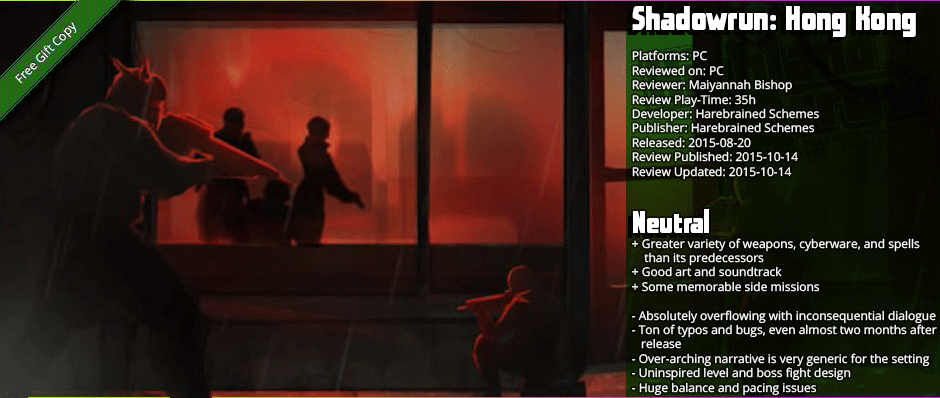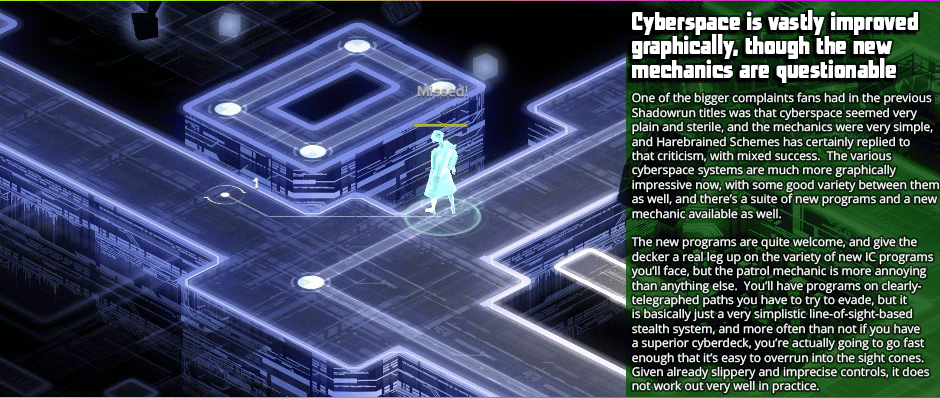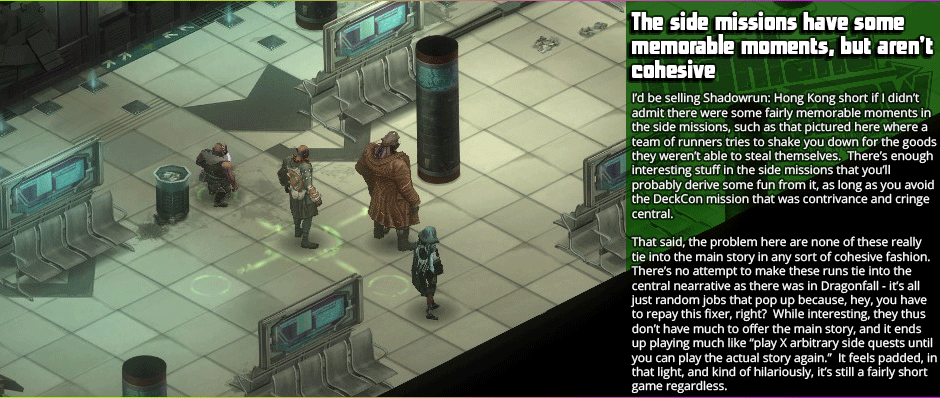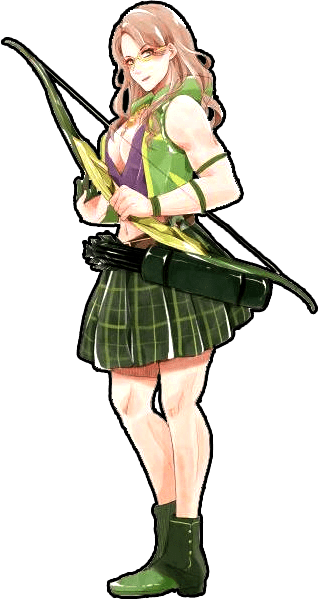

Shadowrun: Hong Kong is the latest stand-alone module in the Shadowrun Returns series developed and published by Harebrained Schemes. Ahh, now here's a game I really, really wanted to like more than I actually did. I rather quite enjoyed Dragonfall, and I suspect you'll see a review of that one soon enough as I play it as something of a palette-cleanser to remind myself that not everything in this arc is as tepid and artless, but well, Hong Kong just left me lukewarm at the very best. I suspect if I wasn't such an ardent fan of the Shadowrun setting to begin with, I probably would be off in the "not recommended" end of the review spectrum here. There's enough to like here that I couldn't just abjectly write it off, but it's kind of the worse kind of neutral game, one neutral not because it's a flawed gem of some sort or because it does a couple of things really well that elevate it from being completely unrecommended, but rather because everything it does well is offset by something it does very poorly. It's a shame, really, but ultimately, the reason I can't recommend this despite the many gameplay improvements comes down to one thing - it commits the cardinal sin of something with such a rich source material - it is just boring. Now having outlined my general impressions enough that I'm sure someone is already angrily typing up response comments or emails, lets dissect this shambling corpse, shall we?
Contrivance is SR:HK story's bread and butter
In wanting to dissect the story, easily the most egregious and irredeemable affront on offer here, I find myself casting my mind back to a bit of writing counsel on recounted to me on more than one occasion: "contrivance is the mark of bad story-telling" And indeed, there is plenty of it on display in Shadowrun: Hong Kong, to an almost-infuriating degree. I really just cannot get on board with the many user and critic reviews whom tout the story of Hong Kong as some sort of masterpiece. Not only is it not up to that standard, it wouldn't get to that standard even if the mile-long list of spelling and grammatical mistakes were all addressed and corrected in turn. Yeah, yeah, I know - English isn't exactly my first language and I'm no one to throw stones in the grammar department, but that almost reinforces my point more than refutes it, as one could argue in response: if someone whom does not speak English as her first language easily and pointedly finds so many mistakes in the overly-lengthy dialogues of Hong Kong then one can easily speculate that one more familiar with said language would only find more. Yet these gripes are minor compared to the contrivances in the plot, and they are many.
Let's start with the set-up shall we? You get an intentionally-vague message from your character's supposed foster-father, and instructions to meet up with them in Hong Kong. You meet up with a supposed foster-brother player and his totally-not-squeeze "partner" and run off to a meeting, where you also meet a group of shadowrunners apparently also hired by said foster father, and then both parties are ambushed, said brother's apparent romantic interest and two of the shadowrunners get instantly offed, and you end up getting to fight through the Hong Kong police force, a blockade you can apparently fight through as a novice fighter with but a smattering of spent karma points (skill points) to your name, only to find out that the police force is hunting you with a furore not even seen with the whole "actually killing a dragon" thing that the player character in Dragonfall did. This does kind of get explained towards the end of the plot, given the identity of your foster father, but in truth, it would have been much more practical to just drive the player off back to Seattle - they have no real reason to stay, no thrilling revenge plot for their loved one to keep them there, and indeed, not much of any real reason to stay. Of course, we wouldn't have a central plot otherwise, so the player stays. That's what I mean by contrivance here - the only reason you stick around is "because plot!"
As if that isn't framing device contrivance enough to keep someone supposedly from Seattle locked into an intrigue in Hong Kong, you essentially have a foreigner being made the leader of the group of Shadowrunners when there's two more long-time shadowrunners either of which would, from the perspective of the fixer that's setting you up, be a better choice. The game makes a big deal about how you'll have to "earn your place" in the community ... and then basically hands you a position. Earn it indeed.
Most player choice is false choice
Of course, it's plot contrivance to work within the gameplay mechanics, because for some reason we can't have the player character not immediately leading a group of Shadowrunners, or for that matter, apparently we can't just have them jump city, which is pretty much the first thing most runners would probably be doing the moment that kind of police attention the player garners comes around. That highlights the campaign's real problem: while it has a lot of little inconsequential things that offer the illusion of player choice, there is next to no actual player choice.
Ideally, a Shadowrun game has essentially three main aspects: the shooting, the technology-based stuff with hacking and decking, and the magic. Each mission should be offering a player specialised in any one of the three to get by. Despite many skill-based dialogue choices to approach problems, however, there will always be just one route to overcome an obstacle.
A pointed example of this comes in one side run where you are hitting up a museum for rare archaeological texts. In the office of the head guy, there is the classic bookcase hiding a secret corridor gambit. You're given several options to present it, including one skill text to look at the texts for something out of place, but only the strength-based skill check will actually proceed you to that corridor. The game is absolutely rife with examples of such false choice, where it looks like there's many more routes to proceed than is possible. There is almost always just one route, with perhaps varying outcomes based upon success or failure with those skill checks, but one critical path all the same. I'm not adverse to linearity in a game, but in a game that's so obviously trying to make you feel as if you're calling the shots, it quickly becomes quite evident you aren't. At no juncture can I say I encountered at actual branching path in the dialogue.
Without spoiling it, this gets really, really pointed towards the end of the game, where you essentially end up tagging along with a character to do the end game quest and then basically just do everything his way with the dialogue choices at that point frustratingly forcing you to just accept those decisions, like them or not.

Loose controls are a considerable bugbear
While the game has been tightened up in other ways, especially in the item pool, which I'll touch on a little later, one area in dire need of improvement that didn't get it is the user interface and controls. The interface feels ramshackle at best sometimes, given that there was recurring bugs where items in the UI would not be drawn in the correct places and other similar bugs - the kind of thing that makes me wonder if there was quality assurance in play here at all - and then there's the controls. There really is no excuse for the controls in this sort of isometric game not to work properly, but since the inception of the first Shadowrun Returns game, it's had some rather large issues with controls. To be fair to Harebrained Schemes, there's really just one central issue that remains. Unfortunately, it's the biggest bugbear of them all.
Specifically, the positioning. Due to the nature of the angle of the game's projection, the player character or NPC characters will always be blocking the "square" to the left and one up from them, and I could not tell you how many times that I went to shoot an enemy in combat that I'd stray one pixel off and suddenly that character is running to stand basically beside the enemy instead. Or, less egregiously, how many times I was left talking to an NPC or character when I wanted to move past or beside them.
There's a kind of new thing introduced here too: the game features sections where you're followed by NPCs you're working with, such a team of friendly shadowrunners you run into, in one mission, where you have to keep them alive, but cannot directly control them. As such, the loose controls are only exacerbated, and it also highlights how suicidal the AI is in Shadowrun games sometimes, since they'll often break cover to run away from the melee enemy just to hunker down beside another enemy who will more often than not then proceed to shoot their ass off. And the less said about the stealth mission where you have your party in tow and have to try to keep them out of sight of the enemy without any direct control and relying on the path-finding. Yeah, just gonna say it, I have no regrets about going loud in that mission.
There's a great deal variety in the weapons and items
One strong spot in the game and an improvement over past offerings is a greater variety in spells, decking programs, and weapons, which certainly make the game a bit more dynamic over its predecessors, and indeed, like cyberspace, that lack of variety seems to be a criticism Harebrained Schemes seems to have paid attention to addressing. (As an aside: it is almost as if they spent so much time addressing criticism of their past outings that they forgot the qualities that made them, especially Dragonfall, so successful and memorable.) There's a lot more to go here, especially when it comes to the cyberware melee weapons (and cyberware in general) and the general melee weapons as well (swords, and et cetera.) It makes for a greater degree of depth in the combat, and given that it
I do have to note though, being the role-play hound that I am, the absence of variety in the armour is a bit disappointing. You get one at each tier for 'decker', 'mage', or 'soldier' and that's your lot. Given that there's a great variety of other armour even within the context of the campaign, it's a bit disappointing, especially since it results in a visual character model difference and thus kind of limits character customisation. No doubt that it would have actually required work in making the new character models is why you do not get more of them. They're also pretty much the same armour from the previous games, with no attempt to really give us armour thematic to the new setting.

The story is paced like an ant pushing a rock across the desert
As I've noted previously, it feels like the focus here was on tightening up the mechanics, and the central story has suffered as a result. There's only a handful of actual story missions, and I'd speculate this is why we have the sort of grab bag mix of side missions padding them out, because without it the game would be tremendously short as a result, maybe a scarce six or seven hours at best. So instead what we get is a game tortuously drawn out in the hopes of meeting some arbitrary game length quota, I can only assume. Personally, I'd rather a short and memorable game to a long and overly-padded one myself, but with Steam refunds under two hours being a thing now, we'll probably be seeing less of the short and punchy game, and I don't really see that being an improvement.
I've touched on how padded the side missions make the game seem, but the other thing at play here is the utter dearth of exposition. Every conversation goes on at some length with descriptive passages and exposition both, and even if it were up to standard (oh, we'll get to that), it's long to the point where I suspect many gamers are going to end up just flipping through whole screens of it just skim-reading, if they do that much at all. I ended up doing that, and you're talking about someone who sings the praises of Planescape: Torment, so you're not exactly speaking of someone who is adverse to overly-wordy dialogue.
Indeed the problem here isn't that it's merely overly-wordy but still good, a la Lord of the Rings, no, the problem is that it goes on over-long and it's bad. Like, in many cases quite bad. I was almost tempted to replay the game and play "count the typos" and "count the grammar mistakes" because as I noted prior, there's plenty of both. Beyond that however, the characters are just ... dull, save one party member I found interesting (the ghoul, for those curious). Most of them are very trope-heavy, and more importantly, just generic to the setting. It's dull, and uninspired - not offensive by any means, but quite boring, frankly. Most of the characters are just uninteresting, when they aren't actively annoying - Is0bel being a particular headache of mine - and when they're trying to be endearing they just come across as annoying and in a couple cases clingy in that particular Mass Effect fashion. "Look at me, look at me! I'm important!" the step-brother character constantly communicates in his dialogue, and it gets quite grating. And they will constantly bog down what would otherwise be rather routine missions in their character exposition, to the point where it was like "yeah yeah guy, I get it, let's get a move on now." Which, again, has the side effect of making the game seem rather padded, because those missions would be rather shorter otherwise. Indeed, cut dialogue out of the missions entirely and most would be under twenty minutes, I'd wager.
Graphics and art design really have been cleaned up
Where previous games, Returns in particular, saw a lot of the clone brush, repeated textures, and the like, one thing that does stand out about Hong Kong is that the visuals are cleaned up. Seams in levels are still occasional but much less occurring then in the previous two games, the engine seems to run quite a bit better at higher resolutions than it did previously, and the art style in general seems cleaner and less muddy.
Indeed, the reason it stands out so much to me that the characters are as generic to the setting is that so much attention seems to have been placed on the theming in the game. The game feels much more at home in the Shadowrun setting at last, and setting-wise, it feels much more like Shadowrun than simply going through the motions, the trap its predecessors, especially Returns, seemed to fall into. The lingo is there but not obnoxious, the visuals follow the art we've seen before much better, and the soundtrack is probably my favourite of the three games, really, fusing the oriental setting with the sort of techno-electronic that has always exemplified Shadowrun in it's iterations both prior (on the SNES and Genesis), and the present series. In short, it evokes the setting much better through art and music direction, and that makes the generic nature of the characters all the more apparent, because they kind of just meld into the theming without standing out any. That's fine for minor NPCs, but when pary members are doing that too, it's somewhat problematic. Don't get me wrong though, that's not knocking on the theming - which is well done here - it's simply become a two-edged sword here. Indeed, this is probably one of the few games I'd say the soundtracks probably worth the DLC purchase; at least, I dug it quite a bit.


